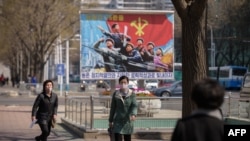North Korea is among a handful of countries in the world claiming to be free of COVID-19. The country is also among the most ill-prepared for a coronavirus outbreak.
"I do think the North Korean government is very well aware of how weak their health care system is," said Katharina Zellweger, director of KorAid, a Hong-Kong-based non-governmental organization. "They're afraid they can't cope with an outbreak, and this is why all these measures were put into place so early."
Zellweger, who has been providing humanitarian aid to North Korea since 1995, spoke during a conference call Monday hosted by the Wilson Center.
She explained that North Korea sealed off its border with China at the end of January, quarantined foreigners and enforced domestic travel restrictions.
Crumbling medical system
North Korea ranked 193th out of 195 countries surveyed, followed by Somalia and Equatorial Guinea, in the Global Health Index, in a study released last October by Johns Hopkins Center for Health Security.
The index gauged each country's level of preparedness for a major infectious disease outbreak. North Korea scored "nil" in the category of infection control practices and the availability of equipment.
"The system of testing and diagnosing an infectious disease is nonexistent in North Korea. Only a few hospitals can conduct blood tests," a Western expert familiar with the medical system in Pyongyang told VOA. The expert requested anonymity.
"North Korea's medical system is fragile and weak, and they're only able to treat only a handful of critically ill patients," Kee Park, a lecturer at Harvard Medical School, said at a forum hosted Tuesday by the U.S. Institute of Peace.
Park, who has been working alongside North Korean doctors for the past 13 years in medical aid programs, cited epidemic modeling by Imperial College London to explain how COVID-19 cases in North Korea will quickly exceed hospital capacity.
Upholding North Korea's claims of virus-free status, Park said he thinks "the North Koreans succeeded in flattening the curve and maybe completely squashed it," but he still advises Pyongyang to "continue to apply the comprehensive preventive measures until treatment and vaccine becomes available."
Economic blow
In a recent report, the World Food Program put North Korea among 49 poor countries at risk of facing devastating economic consequences from the coronavirus. Aid workers say a negative impact is already being felt on the ground.
"Spring and early summer have always been a difficult period with (food) stocks depleting — the so-called barley season," Zellweger said. "And now with trading at nearly a halt, long quarantine for cargo, international transport problems, a possible lack of fertilizer supplies, seeds, plastic sheeting and other agricultural inputs, add additional pressure."
Scott Snyder, director of the U.S.-Korea Policy Program at the Council on Foreign Relations, cautions that North Korea's COVID quarantine measures may give more control to the regime.
"Quarantine increases the scarcity of goods and in turn increases internal dependency on the leadership. … Scarcity, I think, also indirectly serves the state's desire to reassert centralized economic control over distribution and availability of goods," Snyder said.
Other experts point to potential regime instability after the outbreak.
"My fear is that a coronavirus outbreak in North Korea could have devastating effects on the Korean people, on the military and on (the) regime elite, which can lead to internal instability for the regime," said David Maxwell, senior fellow at the Foundation for Defense of Democracies, at the forum hosted by the U.S. Institute of Peace.
William Kim contributed to this report.
